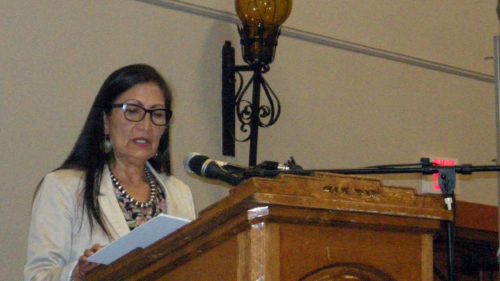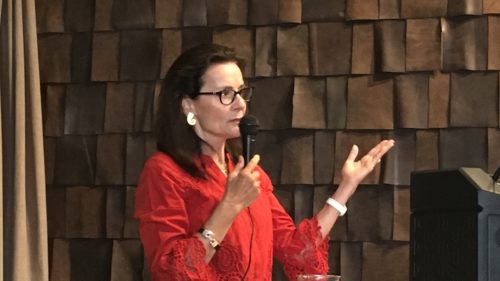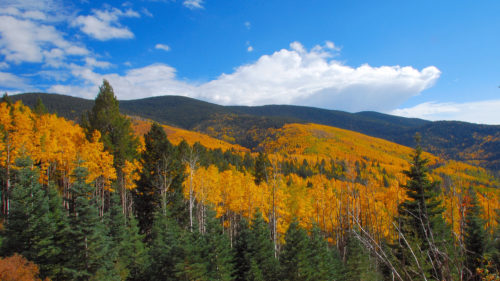By BEN NEARY
NMWF Conservation Director
WASHINGTON, D.C. — The hunting, fishing and outdoor recreational opportunities that generations of New Mexicans have enjoyed are in danger from the growing effects of climate change, the executive director of the New Mexico Wildlife Federation testified to a congressional committee Wednesday.
Jesse Deubel testified to the Subcommittee on National Parks, Forests and Public Lands at the invitation of Chairwoman Rep. Deb Haaland, D-N.M. Several other witnesses from around the West also addressed how climate change is affecting outdoor recreation.
“Climate change is whittling away at our ability to hunt, fish, camp and otherwise enjoy bountiful benefits of our public lands,” Deubel said. “The dollars lost by the decrease in outdoor activities will pale in comparison to the negative effects on an active, outdoor lifestyle.”
Deubel said it’s necessary to act now to ensure future generations have the ability to experience public lands that are wild, sustainable and healing.
Haaland, in her opening remarks, said Congress must consider the effects of climate change on the nation’s communities, livelihoods and the economy.
“Across the country, our public lands support a robust outdoor recreation industry that generates 7.6 million stable, clean, American jobs and nearly $900 billion in annual consumer spending and growing,” Haaland said. “The industry is becoming increasingly vulnerable to climate change, however.”
For example, Haaland said winter sports such as skiing are affected by rising temperatures and shorter snow seasons. Rafting and other water sports are hurt by lower runoff.
“Warmer temperatures are shifting ecosystems, forcing wildlife to shift their behaviors and migration patterns, which impacts hunting,” Haaland said. “In my home state of New Mexico, rising temperatures and drought cause lower stream levels that are expected to reduce the availability of suitable habitat for Gila trout, for example, by 70 percent and could drastically reduce sport fishing activities.”
Deubel testified that Congress needs to to fully fund the federal Land and Water Conservation Fund. Congress established the LWCF in the 1960s to collect money from offshore energy drilling and use the proceeds to purchase lands for conservation around the country. Although Congress recently gave permanent status to the fund, in recent years it has diverted most of the money to other projects.
“Full funding is essential certainly for New Mexico but also for communities across the country,” Deubel said of the LWCF.
Deubel said he’s a native New Mexican and has been hunting, camping and fishing on public lands in the state for more than 30 years. “I’ve seen firsthand the effects of climate change on our precious wildlife population, forests and streams,” he said.
Deubel said the area of the Gila National Forest where he’s hunted turkeys over his lifetime used to be thick with birds. But he said he visited the area this spring and found it almost completely devoid of turkeys because the springs and streams that they depend on have dried up.
Deubel said the diminishing access to water for wildlife extends to every corner of New Mexico. “It is critical that we protect wildlife migration corridors and maintain habitat connectivity so animals can move across the landscape in search of water and forage,” he said.
The New Mexico Legislature this year established a state Office of Outdoor Recreation. Deubel said state officials know that a robust outdoor recreation economy is necessary to the success of the state.
“I have a third-grader who will soon start summer vacation,” Deubel said. “If this year is like the previous 10, many of our forests will close due to high fire danger. The threat is real, the closures are necessary, but heartbreaking nonetheless.”
Rep. John Curtis, R-Utah, the ranking Republican on the subcommittee, said he regrets that there’s a common assumption in discussions about climate change: that if the federal government would simply pass some mythical “one-size-fits-all solution,” that it could solve the issue.
Curtis said he also regrets the notion that no matter what someone’s efforts are to address climate change, they’re not enough.
Action by states, municipalities and individuals necessary to address the issue, Curtis said. “We can’t just depend on the federal government to pass this mythical law that we can’t seem to find,” he said.
Other witnesses were:
_ Callan Chythlook-Sifsof of Berkeley, Calif., a former member of the U.S. Snowboard Team, and indigenous and environmental activist and Yupik Alaskan.
_ Hilary Hutcheson of Columbia Falls, Mont., owner of Lary’s Fly & Supply Shop and a representative of Protect our Winters.
_ Mark Lambrecht of Helena, Mont., director of government affairs with the Rocky Mountain Elk Foundation.
_ Fred Ferguson of Arlington, Virginia, vice president of government and industry relations at Vista Outdoors.



